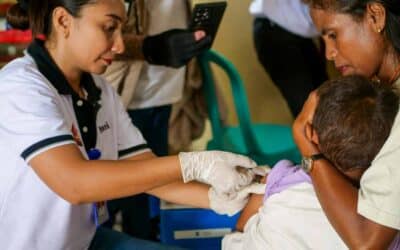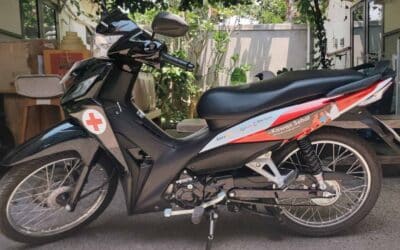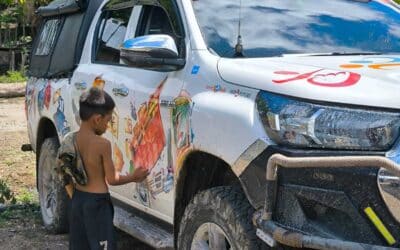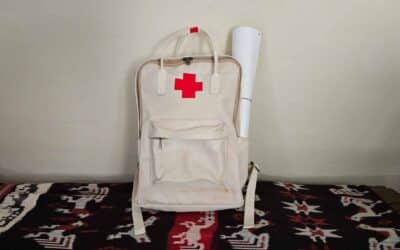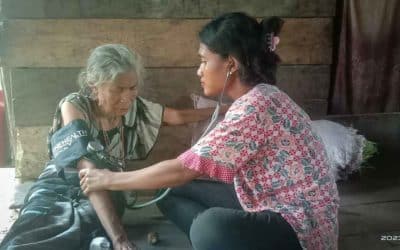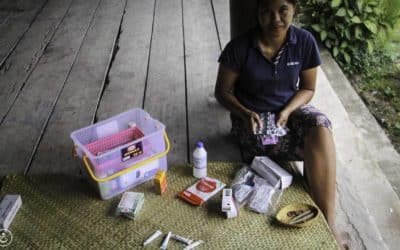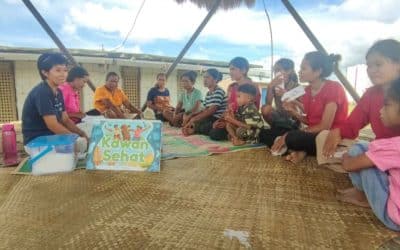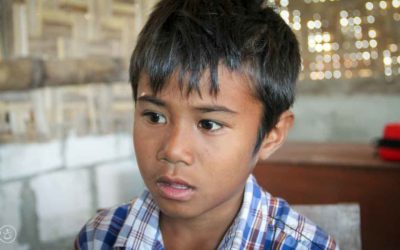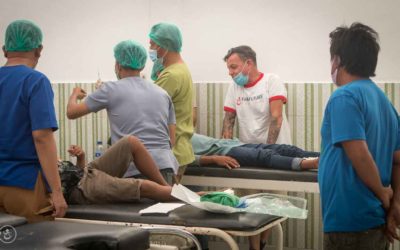Throughout a full day dedicated to primary medical care, our teams screened and treated over 150 patients with an emphasis on malaria and tuberculosis. The provision of vaccinations, medications, and health education not only saved lives but also fostered trust within the community.
Through the Primary Medical Care program, Kawan Sehat health workers provide treatment for fevers, wounds, and malaria in villages lacking access to doctors. They carry essential medicines, adhere to established medical protocols, and refer emergency cases promptly to prevent delays in care.
Donate
Support Care
Programs
All projects
Quick News
Field updates
Stories
Field stories
When possible, conducting life-saving field surgeries in areas without health facilities.
New Scooter for Erwin to Deliver Medical Supplies
We’ve invested in a new scooter for Erwin, our Primary Medical Care field coordinator. This off-road-capable scooter will help Erwin reach even the most remote Kawan Sehat health agents to deliver and restock medical supplies. It’s a small investment of 1,000 Swiss francs, but one that will undoubtedly save lives.
Truck of Life Brings Medical Care to Isolated Communities
For over three years, Fair Future’s Life Truck has provided essential medical care, medicines, and supplies to remote communities in Indonesia. This mobile unit supports primary health care, water connections, and malaria prevention to ensure access to essential resources for well-being.
Sustainable Backpacks for Medical Kits by Fair Future
For our #PrimaryMedicalCare program, the Swiss Foundation has decided to replace plastic medical kits with sustainable and eco-friendly backpacks made from recycled materials. These sturdy bags can store and transport all the necessary medical equipment. Decorated with a simple red cross, it is also our way of paying tribute to the ICRC.
Eastern Indonesia’s Teachers Become First Responders in Critical Rural Healthcare
In ultra-rural eastern Indonesia, the idea of prompt medical care is often a distant dream. Enter Fair Future’s Kawan Sehat agents—a team of over 60 women transforming this grim reality. Equipped with first-aid essentials and life-saving drugs, they’re not just healthcare providers; they’re community saviors
Transforming Rural Healthcare Through Local Teachers
In Eastern Indonesia’s most isolated regions, the closest hospital might as well be on another planet. Who then comes to the rescue? Not medics from distant cities, but local teachers. Trained by Fair Future, these teachers transform into frontline health agents, acting as the first line of defense against life-threatening diseases like malaria, tuberculosis, and polio. This isn’t the future; this is now. Join us in this radical shift in community healthcare.
PMC program pre-assessment in Mbinudita
Fair Future teams examine and investigate more than two hundred cases of various illnesses or injuries treated under the primary medical care program by health workers. We also take stock of what will happen next week to accurately assess the supply of new equipment, drugs and medical devices. We also tell them that three will be part of a “test” screening program for high blood pressure and, in this case, the “prescription” of treatment and an appropriate medical procedure.
A 9-year-old child needs surgery quickly
This little boy’s name is Assaria, he’s nine years old. He has severe 3rd-degree burns to over 24% of his body and requires surgical attention. He is not well, and we have to find a solution together. He can barely walk because of terrible burns to his legs and back. The consequences while growing up are significant circulatory and neurological problems. If nothing is done, he risks a double amputation. Let’s help him get surgery for severe burns on both legs before his health deteriorates.
Truck of Life goes everywhere almost no one goes
The truck of Life is so important… It allows us to go where almost no one ever goes. To meet people who have unexpected problems. To provide medical care, to take children or even a doctor or dentist to the nearest town. Truck of Life allows us to bring equipment, food, and drinking water where no one goes while ensuring the safety of our volunteers and specialized collaborators. Indeed, hundreds of thousands of people live in the most inaccessible territories who do not have access to the most basic needs to ensure a healthy life: No access to medical care, drinking water, or a light source for children to read or study.
Days of medical care in rural areas
Discover the different contexts and situations in which Fair Future teams intervene to provide care, including crisis and natural disaster situations, and how and why we adapt our activities to each. Days of care like the one we present to you below we do dozens of them a year and they are adapted to people from rural areas, who for the most part have never seen a doctor before us.



